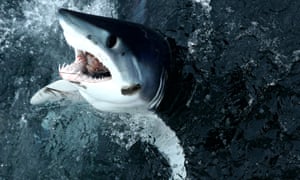Conservationists accused the EU and the US at negotiations of Atlantic fishing nations this week of blocking urgently needed plans to protect the world’s fastest shark species.
The strength and speed of the shortfin mako, which can swim up to 43mph, makes it a target for sports fishermen, particularly in the US, while its highly prized meat and fins have led to the shark being overfished globally – and dangerously so in the north Atlantic.
The population could take five decades to recover even if fishing were to stop immediately, according to scientists at the International Commission for the Conservation of Atlantic Tunas (ICCAT), a fisheries management organisation.
The majority of mako caught in the north Atlantic in 2019 were landed by EU vessels, mainly from Spain and Portugal followed by Morocco. Most mako sharks are bycatch – accidentally caught by boats hunting different species.
Last year, international governments voted to regulate trade in the endangered species, under the Convention on International Trade in Endangered Species, after the EU co-sponsored a proposal.
But there was no outright ban, and this week Britain – in its first official act as an independent member of ICCAT – backed a proposal by Canada for such a ban. The UK said it was extremely disappointed that no agreement had been reached in 2019.
The EU and the US, however, refused to back the ban, saying it would not in itself stop mako mortality as bycatch. Each suggested separate proposals that would allow boats to continue to land mako in certain circumstances. Given the lack of consensus, the ICCAT committee chairman said he had no choice but to postpone any decision on mako catches until 2021.

“North Atlantic mako depletion remains among the world’s most pressing shark conservation crises, yet the EU and US put short-term fishing interests above all else and ruined a golden opportunity for agreeing a clear and simple remedy,” said Ali Hood, director of conservation for the Shark Trust.
Grantly Galland, an officer for the Pew Charitable Trusts’ fisheries team, said the delay in adopting a ban would speed the decline of a species already at dangerously low population levels.
“The only real advice from scientists to ICCAT is to have a no-retention policy. Another year of catching at the current level will leave the population in the north Atlantic in even worse shape,” Galland said.
Scientists warned last year that the important predator was declining faster than previously thought. They recommended annual landings of mako in the north Atlantic be reduced from 3,000 tonnes to 300, to allow the population to recover.
Ian Campbell, associate director of policy for Project Aware, a non-profit working with sports divers in ocean protection, said: “It has been heartbreaking to watch the US devolve from a global shark conservation leader to a primary obstacle to international, science-based protections for endangered makos.” He urged the incoming Joe Biden and Kamala Harris administration to “restore US commitment to science and the precautionary approach”, particularly for vulnerable marine life.